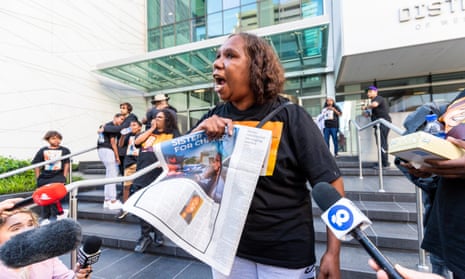The family of a Geraldton woman shot dead by a Western Australian police officer has said there is “no equality” and “no justice” for Aboriginal people after the constable was acquitted of her murder on Friday.
“In terms of Aboriginal people, we don’t get no fairness, there’s no equality and this is evidence with what’s happened here,” Bernadette Clarke, the sister of the victim, known as JC for cultural reasons, said on the steps outside Perth’s district court.
The 29-year-old Yamatji woman JC was fatally shot by a WA police first-class constable in a suburban Geraldton street in 2019. The constable, the first police officer to be charged with murder in WA for nearly a century, and who is still a serving officer, cannot be named for legal reasons.
Clarke said JC’s family had been left “broken” by her death.
“All it took was 17 seconds, 17 seconds from when he jumped out the car [to the single, fatal shot being fired],” she said.
“You wonder why Aboriginal people are so angry and disillusioned with the police and the system ... we have laws for white and laws for black.”
Anne Jones, JC’s foster mother, now cares for JC’s son.
“Six years of age he was when he lost his mother, and now he’s nine,” she said.
“[The police officer] is going home to his wife and children and this kid’s got no mother.”
Family supporter and Noongar woman Megan Krakouer said there was still “no equality” for Indigenous people, 30 years after the Royal Commission into Aboriginal Deaths in Custody.
“This is unacceptable what’s happened, this is absolutely unacceptable … this is what we have to deal with in the state of Western Australia. This happens far too many times and it hurts, and it’s wrong,” she said.

Family spokesman Sandy Davies said the verdict was demonstration there was “no justice” for Aboriginal people in Western Australia.
“The justice that is served on Aboriginal people and the justice that is served on non-Aboriginal people are two totally different laws,” he said.
JC was shot and killed after police responded to a welfare call from JC’s sister, who had told them she was concerned JC was walking down a street holding a knife and pair of scissors.
JC had experienced significant mental health and drug problems and recently been released from prison.
The defence lawyer, Linda Black SC, told the court JC had ignored repeated requests to drop the knife from the officers at the scene.
The jury was shown CCTV footage, taken from a home about 65 metres away, of JC being shot while surrounded by police vehicles.
The director of public prosecutions, Amanda Forrester SC, argued the footage showed JC did not move towards the officers.
Black said her client had acted correctly by drawing his gun, rather than a Taser, when confronting a person armed with a knife.
Quick GuideHow to get the latest news from Guardian Australia
Show

Email: sign up for our daily morning and afternoon email newsletters
App: download our free app and never miss the biggest stories
Social: follow us on YouTube, TikTok, Instagram, Facebook or Twitter
Podcast: listen to our daily episodes on Apple Podcasts, Spotify or search "Full Story" in your favourite app
She said the officer had never fired his gun while on duty and had less than a second to decide whether to pull the trigger given his proximity to JC.
“He was not some trigger-happy constable ... he was a brave and careful officer who took pride in his job,” Black said.
“[JC] was never, ever going to drop the weapons. She needed to be taken down; she was never going to surrender.”
After a three-week trial in the Perth district court, a jury deliberated for just over three hours on Friday before returning not guilty verdicts to both murder and manslaughter charges.
Outside court, Black said the constable was deeply remorseful.
“My client was a police officer who did his job and did it to the best of his ability,” she said.
“Very sadly, a young lady lost her life, and he has had no opportunity to be able to express his sorrow for that. He would like to do that today to say how sad he is.
“For someone like him who entered this job because he wanted to do good in the community, and who wanted to help not harm, it’s been an extremely difficult process.”
The acquitted officer – cleared of all criminal wrongdoing – remains a serving member of the WA police force, but was stood down after the shooting. A decision has not yet been made on his future.
The WA police commissioner, Chris Dawson, said JC’s shooting had led to one of the most difficult periods in relations between Aboriginal people and the state’s police force.
“I am aware that emotions are running high. I appeal to leaders in our community to lead by example.”
A WA coroner will hold a public inquest into JC’s death.
